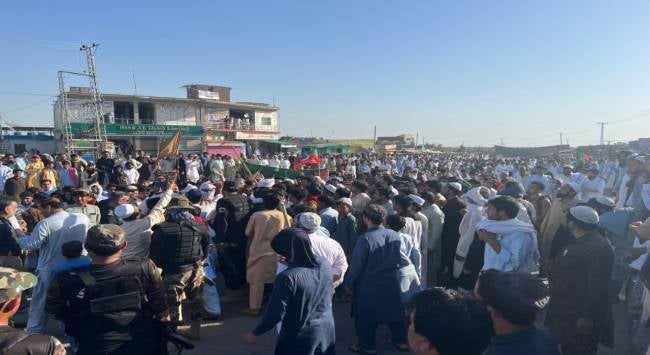Summary
The arrest of Pakistan’s former prime minister, Imran Khan, at the Islamabad High Court has plunged the country further into unrest and political turmoil. The elements of his arrest and its aftermath are telling. The numerous legal cases, corruption charges and the notable involvement of the National Accountability Bureau reflect the mounting legal pressure directed towards him and his political party. The dramatic circumstances of his arrest signify the alignment between the ruling coalition and the influential security establishment to silence him. The incidents of violence and destruction in the aftermath reflect the erosion of trust in the military’s reputation. Khan’s arrest also revealed the wedge between the apex judiciary and the executive.
The arrest of Pakistan’s former prime minister and chairman of the Pakistan Tehreek-e-Insaf (PTI), Imran Khan, at the Islamabad High Court on 9 May 2023 has plunged the country further into unrest and political turmoil. The elements of his arrest and its aftermath are telling.
Khan faces over a hundred legal cases, including corruption charges in a high-profile land transfer case (Al-Qadir Trust case) which is currently under investigation by the National Accountability Bureau (NAB), a federal body established during General Musharraf’s regime in 1999 to combat corruption. However, its notorious image as a tool to intimidate and silence political rivals of ruling governments reflects the increasing legal pressure directed towards Khan and his political party. Moreover, the powerful imagery of Khan’s arrest carried out by the Pakistani Rangers, a paramilitary force operating under the Interior Ministry and often led by army officers on secondment, conveys a significant symbolic message: both the ruling coalition and the influential security establishment are aligned in their approach to silence Khan.
The consequences following Khan’s arrest further strengthen the government’s resolve in depicting the PTI as a militant organisation that poses a security risk to the state. This perception is fuelled by incidents such as supporters storming the General Headquarters of the Army, setting the residence of the Lahore Corps Commander ablaze, damaging a memorial of the Pakistan Air Force in Punjab and setting fire to a decommissioned aircraft at the Mianwali air base. Foreign Minister Bilawal Bhutto’s comments are instructive: ‘engage with the NAB as citizens and not as terrorists’. Prime Minister Shehbaz Shariff echoed a similar point in his warning that ‘damaging public property is an act of terrorism’. The escalated tensions between the armed forces and protesters expose a significant decline in the reputation and credibility of the military, an institution that has traditionally been revered for its role in safeguarding the territory and ideals of the Islamic republic as well as for its strict discipline and professionalism.
Khan, a polarising and charismatic political figure, is seen as an alternative to the dynastical political parties (the Pakistan Peoples Party and the Pakistan Muslim League – Nawaz). His continued criticism of the establishment has raised debate over the army’s ability to maintain public confidence and effectively carry out its primary duties of national defence and safeguard the country’s interests. Moreover, in blurring the lines between the military and political factions (whom Khan has deemed as diabolical, self-serving career politicians) has eroded public trust in the military as a non-partisan, impartial institution. His arrest is widely perceived as a defensive measure taken by the authorities to suppress any potential threats or challenges posed by his influence. This move reflects a broader trend of using legal means to neutralise the PTI as more arrests continue to take place. As Madiha Afzal rightly notes, ‘The military showed Imran Khan and the country its red line’.
Finally, following Khan’s arrest, a rift between the judiciary and the executive branch became evident as the Supreme Court deemed the execution of the arrest warrant within the premises of the Islamabad High Court unlawful, violating Khan’s right to access justice and compromising the sanctity and safety of the Court. The Supreme Court, citing the infringement of fundamental rights enshrined in the Constitution, ordered Khan’s immediate release. Khan’s arrest reflects broader concerns over the use of legal means to suppress political opponents, raising questions about the eroding state of Pakistan’s democracy, public trust in institutions and the army’s overt interference in Pakistan’s governance. This adds to the need to safeguard democratic principles and ensure the independence of the judiciary in the country. Khan is to be produced before the Islamabad High Court on 12 May 2023 with foolproof security for the hearing of his writ petition filed to challenge the NAB’s action against him.
. . . . .
Dr Imran Ahmed is a Research Fellow at the Institute of South Asian Studies (ISAS), an autonomous research institute in the National University of Singapore (NUS). He can be contacted at iahmed@nus.edu.sg. The author bears full responsibility for the facts cited and opinions expressed in this paper.
Pic Credit: PTI@Twitter
-
 More From :
More From :
-
 Tags :
Tags :
-
 Download PDF
Download PDF



